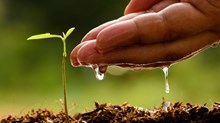Why Going Green is Good for Your Soul

If we were to take our cues primarily from the media, we'd naturally believe that environmentalism is, at heart, a political issue—and a heated one at that. We'd assume that it's a secular vs. "Christian" issue. We'd accept that if we fall within one particular political camp, we ought to avoid—maybe even reject—anything that smacks of green.
But of course, as Christians, we don't build our lives upon the shifting sands of media messages or opinionated shock-jocks. We build our lives and our values upon the solid foundation of God's Word. In Scripture, we find a clear and unambiguous message about planet Earth and how we ought to relate to it.
God's World . . . God's Call
We discover first and foremost that this entire world is God's. God made it, and it belongs to him (Genesis 1:1; Psalm 24:1). God is glorified by it (Psalm 19:1). God reveals himself through it (Romans 1:20). God sustains it (Colossians 1:17). And God's ultimate plan is to redeem and restore it (Revelation 21:1-2).
And while God is doing all this creating, sustaining, and revealing, he has also given us a job to do. The very first calling he had for the very first human was "to tend and watch over" the Garden of Eden (Genesis 2:15). Earlier in Genesis, God tasks humanity with this expansive purpose: to "reign over" and "govern" the planet—the animal life, the plants and habitats, the natural resources God made (Genesis 1:26, 28). Various Scripture translations add nuance to our understanding of this God-given task: to "rule" (NIV), to "have dominion," and "subdue" (KJV).
Unfortunately, we can make the grave theological error of viewing this job through the lens of human power, finding license in Genesis 1 for taking, hoarding, spending, wasting, harming, degrading, and even destroying earth's resources and plant and animal life. But if we understand Genesis 1:26-28 properly, in context, we see this task of "governing" linked directly with language about being made in God's image. Thus our governance of earth's resources ought to reflect God's character rather than human self-centeredness.
Sounds Good, But . . .
The biblical case for environmental stewardship sounds great in principle, but in practice it can seem expensive and complicated. After all, what about the higher price of organic food, hybrid cars, energy-efficient appliances, and light bulbs? And isn't it easier to just toss everything in the trash rather than have to sort recyclables? It seems like a lot of work to make one's home energy efficient. Can't I just live life as normal?
We may feel tension at times between stewarding the earth and making good use of our money to do this. I've experienced the tension myself. But as I've tried to gradually become a bit more green, I've been learning something freeing: Living as a faithful steward of the environment goes hand-in-hand with the classic Christian discipline of simplicity.
Real Simple
Have you ever felt this desire: "to un-complicate and untangle my life so I can focus on what really matters"? I feel it—continually! Adele Ahlberg Calhoun, in her Spiritual Disciplines Handbook, cites this spiritual longing as a means through which God draws us into practicing simplicity. Calhoun explains, "Simplicity cultivates the great art of letting go. Simplicity aims at loosening inordinate attachment to owning and having. Simplicity brings freedom and with it generosity." In our consumerist culture obsessed with wanting "newer," "better," and "more," we desperately need the discipline of simplicity. "Christian simplicity frees us from this modern mania," writes Richard Foster. "It brings sanity to our compulsive extravagance and peace to our frantic spirit."
Cultivating simplicity is about an inward focus that is expressed in outward choices. In the arenas of our daily living—possessions, habits, time management, spending patterns, even our meals—growing in simplicity means aiming to "Seek the Kingdom of God above all else" (Matthew 6:33). This focus helps us learn to be content with less rather than lusting after more. It enables us to intentionally focus our time and energy on what's important rather than overstuffing the calendar or fragmenting our lives into a zillion, multitasking pieces. It means, in a very practical sense, practicing old-fashioned frugality—like living on a tight budget and working hard to save money as a wise steward of family finances. Counter-intuitively, all this paring down actually frees us up to more deeply love God, to more generously love others, and to live as better environmental stewards in the process.
The Power of Daily Choices
Each day we make countless choices and live out deeply ingrained habits that all add up to a lifestyle. These choices wield power. Often our choices have unintentional negative ramifications. For example, the money we spend on food may be supporting factory farms. The soil and chemical run-off from these farms are killing river species (rendering half of America's rivers and streams unsuitable for life), and creating oceanic dead zones that are devastating marine life (such as the 7,000 square mile dead zone in the Gulf of Mexico).
Or consider the air pollution and carbon emissions caused from excessive energy consumption. This contributes to air so polluted in some urban and industrial areas that scores of adults and children suffer serious respiratory and cardiovascular ailments. It taints fish with mercury that, when consumed by a mother, can cause brain damage or even death in a fetus in utero. And according to 97 percent of the world's leading climate scientists, air pollution and carbon emissions are causing climate change with a ripple effect of devastating consequences for earth's plant and animal life and, especially, upon the poor around the globe.
The good news is that our daily choices wield more than destructive power; we also have the opportunity to render blessing through our choices. We can support sustainable family farms that utilize earth's resources in a health-giving manner. We can make small choices to reduce energy use that add up to a big reduction in our carbon/pollution "footprint." We can use household products that don't end up poisoning wildlife in streams and rivers. We can reduce the amount of trash we produce by buying fewer throw-away products and recycling more.
"Day by day, decision by decision, we need to be asking ourselves: Will this purchase or this choice bring me closer to God? And will it help me love my neighbors?" says Nancy Sleeth, co-founder of Blessed Earth and author of Almost Amish. "The answers to those questions will always lead us down the right path. And that gives me hope—that, decision by decision, I can be part of the solution rather than part of the problem. And as millions and millions of people, decision-by-decision, based on their faith in Christ want to become part of the solution, huge things will happen."
Reduce, Reuse, Recycle
Here, within the small and daily choices we make, we discover the natural blending of obedient creation-stewardship and God-honoring simplicity. "If you drew a Venn diagram comparing frugality and good stewardship of the earth, the two values would overlap 90 percent of the time," Sleeth says. "Most of the things we do to be good stewards of the earth involve not spending money—not running to the mall for things you don't need, not buying stuff that just ends up in our attics and closets and basements, not running out for fast food which is actually more expensive than cooking a simple homemade meal."
Though the remaining 10 percent does cost more (such as the cost of organic or locally-farmed food versus factory-farmed food), Sleeth explains, "the cost is more than offset by going out to eat less or packing a lunch when you go to work." Other "old fashioned" simplicity practices, like gardening, composting, line-drying clothes, or hand-washing dishes, all end up being more environmentally friendly than their modern, "convenient" counterparts.
The "3 Rs" of environmentalism—Reduce, Reuse, Recycle—fit naturally within a simple-living focus. We can reduce the amount of energy we consume. We can wisely reuse containers and repair broken items rather than just buying more and more and more. We can recycle our trash—and vastly decrease our garbage output.
If attempted all at once, suddenly trying to build a green life would seem like an overwhelming, complicated, and expensive endeavor. But Sleeth, whose family has cut their energy usage by two-thirds and reduced their trash output by nine-tenths, advocates a more grace-filled approach: "We need to think of creation care as a journey. In my family, we continually and prayerfully examine every area of our lives and see if we can do a bit better each year. If we can do 10 percent better each year, then we know we're on the right path."
Simple . . . But Abundant
As we strive to resist the modern trappings of consumerism and frantic-paced living, we're liberated to live a more God-connected life. Time spent in nature—walking, gardening, playing, taking pictures, camping—helps us spiritually slow down, be still, and recognize God's presence (Psalm 46:10). And as we care for the environment and spend time appreciating it, nature draws us into worship. We find that in our caretaking efforts—in sacrificing "convenience" for the sake of the created world, or in forgoing the coveted "more" in order to consume less—we experience a different kind of abundance: the Christ-given "rich and satisfying life" (John 10:10).
Photo by woodleywonderworks / Flickr
Read more articles that highlight writing by Christian women at ChristianityToday.com/Women
 Read These Next
Read These Next

 10 Ways to Celebrate Earth DayTips on how to live in sustainable simplicity
10 Ways to Celebrate Earth DayTips on how to live in sustainable simplicity
 Who Says Women Don't Want Sex?What to do when you want it more often than your husband
Who Says Women Don't Want Sex?What to do when you want it more often than your husband








 Homepage
Homepage
